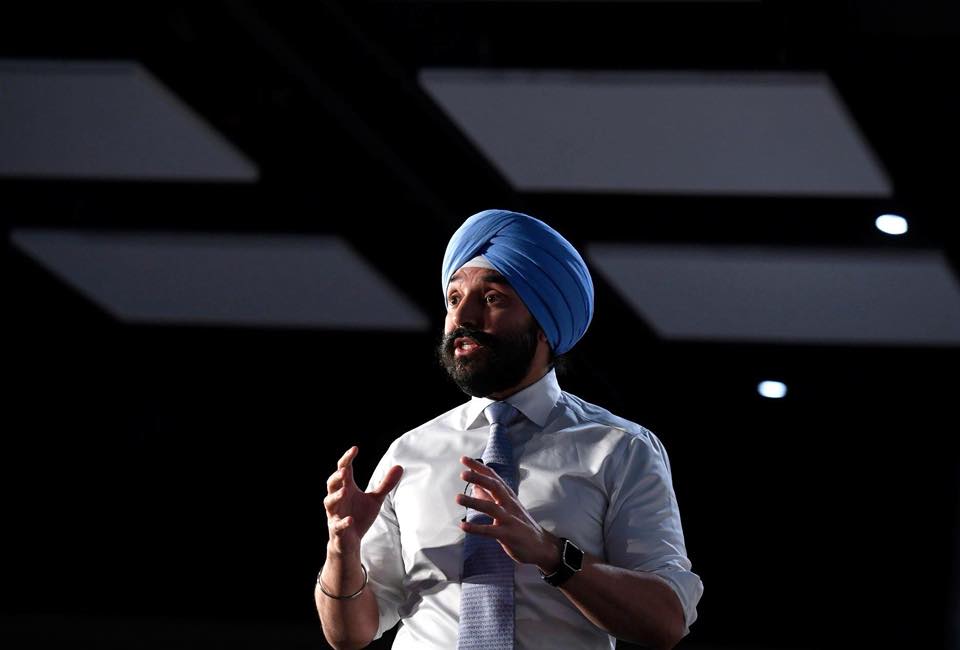Canada News
Canada’s telecom minister sets out government’s priorities for regulatory policy

“Our government is focused on improving the quality, coverage, and most importantly, the price of telecommunications services for Canadians – no matter where they live,” Innovation Minister Navdeep Bains who is responsible for telecommunications said in a statement. (File Photo: Navdeep Bains/Facebook)
OTTAWA – The Canadian government signalled a shift in telecommunications policy on Tuesday, saying the industry’s regulator will be required to consider affordability as a high priority when it makes future regulatory decisions.
“Our government is focused on improving the quality, coverage, and most importantly, the price of telecommunications services for Canadians – no matter where they live,” Innovation Minister Navdeep Bains who is responsible for telecommunications said in a statement.
“We are ensuring that telecommunications policy will be made through a consumer-first lens to ensure Canadians have access to quality services at more affordable prices.”
The new directive will require the Canadian Radio-television and Telecommunications Commission to consider “competition, affordability, consumer interests, and innovation” when making decisions.
CRTC spokeswoman Patricia Valladao said in an email that the commission has taken note of the government’s proposed policy direction and will implement it once it comes into force.
It wasn’t immediately clear how the Trudeau government’s directive will be interpreted by the CRTC, consumers or industry players, such as the country’s providers of mobile, internet, cable and phone services.
Competition is already one of the CRTC’s long-standing criteria, as are consumer interests and innovation.
However, various studies and consumer anecdotes have said Canadians pay significantly higher prices for many telecommunications services compared with consumers in other countries.
“A lot of it sounds the same in terms of innovation and competition and all that,” consumer advocate Laura Tribe, of OpenMedia, said in an interview
“But one of the biggest changes is that it no longer relies on market forces (to determine pricing), so it frees the CRTC up in some cases.”
Major carriers – which include BCE’s Bell Canada, Rogers Communications, Telus Communications – often point out that they’ve spent billions to upgrade world-class networks that reach even sparsely populated areas of a large country.
Tribe said she thinks that Bains and the Department of Innovation, Science and Economic Development have removed barriers that restricted the regulator’s involvement in prices.
“I think, politically, this is a pretty big move from ISED – putting the CRTC on notice and reaffirming that (the commissioners) need to be putting customers first . . . not Big Telecom.”
“I think that’s the fundamental shift we’re seeing here.”
The CRTC is a semi-autonomous, quasi-judicial body that’s supposed to allow its government-appointed commissioners to make highly technical decisions with minimal political interference.
However, successive Liberal and Conservative governments have used policy directives to dictate the CRTC’s strategic priorities, which are at times at odds with each other.
In a statement, Bains – who has been ISED minister since the Liberals came to power – said Tuesday the government aims to improve telecommunications services for Canadians – a promise that has been made by previous governments.
The proposed policy he announced Tuesday says the CRTC will “encourage all forms of competition,” “foster affordability and lower prices,” and “reduce barriers to competition for new and smaller telecommunications service providers.”
Tribe said the new directive will likely free the CRTC to support MVNOs – mobile virtual network operators – that want greater ability to buy wholesale access to the bigger carriers wireless networks.
“Previously, we’ve seen the CRTC issue decisions that say (it’s) been directed to allow market forces to prevail, which basically reinforces the Big Three’s dominance over the field,” Tribe said.
In a pair of related decisions in 2017, the CRTC took the position that the prevailing policy emphasized the need to encourage investment in “facilities based” services with actual physical infrastructure.
Bains, as minister for innovation, science and economic development, later instructed the CRTC to reconsider those decisions because of the need to bring down prices through competition.
The CRTC essentially stood by its previous decisions with its March 2018 response to Bains, but said it would take a broader look at the MVNO issue this year.





















